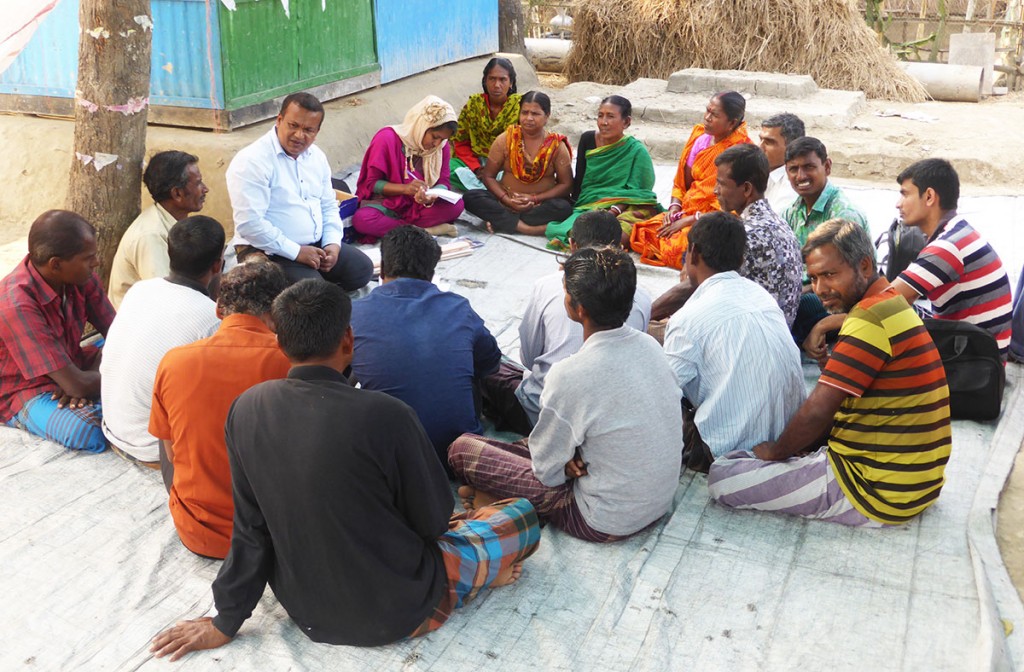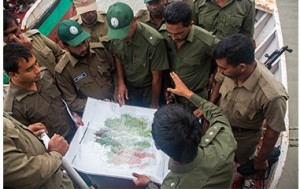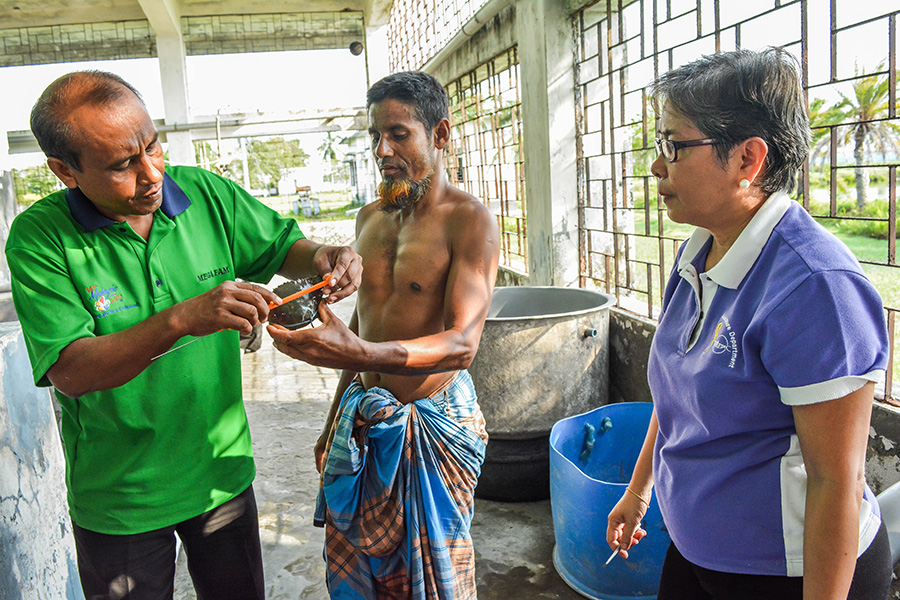Management of the Sundarbans Mangrove Forests for Biodiversity Conservation and Increased Adaptation to Climate Change (SMP)

OBJECTIVE
Government agencies at the national and local level, that are responsible for the management of the Sundarbans Mangrove Forests (SMF), as well as Co-Management structures, have implemented mechanisms that improve the management of the SMF.
This is being achieved through the three components:
- The coordination by the local representation of the BFD in Khulna of the different measures that are being implemented in the SMF by government agencies, donors and NGOs is improved.
- The participation of SMF resource users (both women and men) in Village Conservation Fora (VCFs) in the pilot region Chandpai Range has been improved.
- The tools and capacities of the personnel of the local BFD for the management of the SMF have been improved.
PROJECT DESCRIPTION
“The training is an extension of our efforts to protect the Sundarbans by using information management approaches. The SMART patrolling approach will help us to better combat poaching, illegal fishing, vessel and pollution infractions, and other forest crimes. It will strengthen the capacity of our frontline staff and at the same time build training capacity for forest protection within our ranks.”
said Mr. Zahir Uddin Ahmed, Conservator of Forests, Khulna Division, Bangladesh, who is jointly leading the training of trainers for SMART.
Sustainable mud crab production to offer alternative sources of income and contributes to the preservation of wild populations in the Sundarbans
Mud crab farming is an important income generating activity for local people living in the periphery of the Sundarbans. Recently, the mud crab sector has seen a sharp rise in Bangladesh with an estimated 300,000 people depending on it. As all seed stock needed for mud crab farming is collected from the wild, mainly estuaries and mangroves of the Sundarbans, the current level of seed stock harvesting is likely not sustainable. This poses a risk to the ecosystem and to the livelihood of people depending on this resource.
In order to conserve biodiversity and to make the mud crab business more sustainable, the “Management of the Sundarbans Mangrove Forests for Biodiversity Conservation and Increased Adaptation to Climate Change” (SMP) Project together with the Bangladesh Forest Department established a partnership with the Bangladesh Fisheries Research Institute to support them with technical expertise on the development of economically feasible mud crab hatcheries. Through providing additional seed stock, pressure on wild crab populations in the Sundarbans can be reduced and alternative employment opportunities for the coastal community would be promoted. Additionally, mud crab farming is regarded as less vulnerable to deteriorating water quality and changes in salinity thereby contributing to a higher resilience of local communities to the impacts of climate change.
“I am proud to say that we produced healthy crablets (juvenile crabs) – a significant milestone in the progress towards an economically feasible mud crab hatchery. The establishment of a mud crab hatchery is a challenging process that has required several years of research in the Philippines. Likewise, if the Bangladesh Fisheries Research Institute continues investing in the development of this expertise, it will certainly profit from the large potential I can see for this sector in Bangladesh.”
,concludes Dr. Emilia T. Quinitio, Aquaculture Department of the Southeast Asian Fisheries Development Center, Philippines, after having accompanied the Bangladesh Fisheries Research Institute through two trials.
Participatory governance assessment strengthens co-management of the Sundarbans mangrove forest

SMP has a special focus on gender and women empowerment,
here during the participatory governance assessment
Copyright: © GIZ BD/ Carina van Weelden
For the first time, a governance assessment of protected areas was conducted in the Sundarbans. The governance assessment evaluated current governance mechanisms and structures in order to identify areas for improvement and formulate recommendations to make the governance of the Sundarbans more efficient, effective, equitable and sustainable.
The assessment was a highly participatory process involving more than 150 (non-) governmental stakeholders and community members through Key Informant Interviews, Focus Group Discussions and workshops. The exercise identified best practices and challenges related to topics such as sharing of benefits, participation, accountability, and law enforcement. As a result, a set of recommendations towards better governance was jointly agreed upon by all stakeholders and presented to the Bangladesh Forest Department at the national level for further action. One of the recommendations, for instance, was to more clearly allocate the co-management responsibilities within the BFD organizational structure. The Bangladesh Forest Department and development partners have appreciated the results as helpful for improving management of the Sundarbans and designing future interventions. Under the umbrella of SMP, the assessment was undertaken by an independent facilitation team with expert support from IIED, UK, and the sector program on ‘Implementing the Biodiversity Convention’ of GIZ Germany.
“We depend on the Sundarbans to protect our homes from storms and to provide us with what we need for life: fishes, firewood and natural building material. We resource users, who regularly go into the forest, have a lot of knowledge about the Sundarbans that we can share with others to preserve it for future generations. Co-management around the Sundarbans needs to be strengthened at the community level so that resource dependent people can have a say in what happens to the Sundarbans and its natural resources.”
, states Rezina Majhi, member of the Village Conservation Forum, Peoples Forum, and Co-management Committee in Chadpai Range during a multi-stakeholder workshop for the governance assessment of the Sundarbans.
VIDEO
PUBLICATIONS
- Hatchery-Based Mud Crab(Scylla spp.) Production in Bangladesh
- Management of the Sundarbans Mangrove Forests for Biodiversity Conservation and Increased Adaptation to Climate Change Project (SMP)
- Enhancing conservation law enforcement and monitoring in the Sundarbans mangrove forest through the Spatial Monitoring and Reporting Tool (SMART)
- Support to Co-Management in the Sundarbans Mangrove Forest
- Experiences and added value Assessment sites of participatory governance assessments of protected areas in Bangladesh, Laos and the Philippines
- Hatchery-based Mud Crab Production at BFRI Paikgacha Station, Bangladesh
- Handbook for Smart Patrols in the Sundarbans Mangrove Forest of Bangladesh
COUNTRY
Bangladesh
DURATION
May 2015 - Apr 2019
Commission Agency
BMZ



